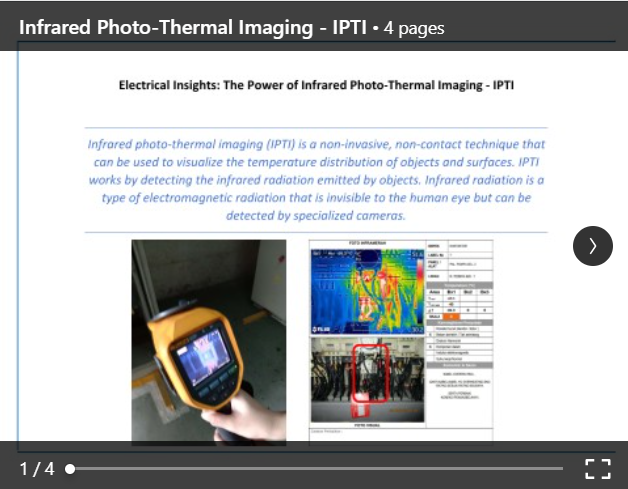In the world of electrical engineering, safety, reliability, and efficiency are paramount. Electrical systems, from power generation to distribution, are the lifeblood of modern society, providing the energy that powers homes, industries, and infrastructure. To ensure these systems operate at their best, various tools and technologies are employed. In this article, we explore the transformative capabilities of Infrared Photo-Thermal Imaging (IPTI) and its significance in the electrical industry.
- The Basics of Infrared Photo-Thermal Imaging
Infrared Photo-Thermal Imaging, commonly referred to as IPTI, is an advanced non-invasive technology used to analyze the temperature distribution in electrical equipment, components, and systems. It leverages the principles of thermal imaging and infrared imaging to provide detailed insights into the thermal behavior of electrical installations. The core of IPTI involves the following elements:
-
Infrared Cameras: Sensitive to infrared radiation, these cameras capture temperature variations in electrical components and convert them into visible images. The resulting images can be color-coded to represent different temperature ranges.
-
Thermal Analysis Software: This software processes the infrared images and provides data analysis, generating comprehensive reports that highlight hotspots and anomalies in the electrical system.
The Power of IPTI in the Electrical Industry
-
Early Detection of Electrical Issues: IPTI is a game-changer in preventive maintenance. It allows electrical engineers and technicians to identify potential problems well before they escalate into costly failures. Hotspots, loose connections, overloaded circuits, and other issues that can lead to electrical fires or system breakdowns can be detected early, enabling proactive measures to be taken.
-
Enhanced Safety: Electrical systems can pose significant risks, from electrical shock hazards to fires. By pinpointing areas of concern through thermal imaging, safety can be improved. Maintenance personnel can address issues without endangering themselves or the system's reliability.
-
Increased Efficiency: Electrical components generate heat during normal operation. However, excessive heat can be a sign of inefficiency or impending failure. IPTI helps identify areas where energy is being wasted and allows for optimization of electrical systems to improve energy efficiency.
-
Downtime Reduction: Unexpected downtime in industrial settings can result in substantial financial losses. IPTI aids in the proactive identification of potential problems, enabling maintenance teams to schedule downtime for repairs and maintenance when it's most convenient and cost-effective.
-
Compliance with Standards: Electrical installations are subject to safety and compliance regulations. IPTI assists in meeting these standards by identifying issues that need to be addressed to ensure that the system operates safely and according to industry regulations.
- Real-world applications of IPTI
-
Electrical Substations: IPTI is widely used in electrical substations to identify hotspots in transformers, switchgear, and other critical components. Early detection of issues in these facilities is crucial to ensuring the reliability of power distribution.
-
Data Centers: Data centers house sensitive equipment that generates substantial heat. IPTI helps identify cooling system inefficiencies and potential issues in power distribution units, reducing the risk of system failure and data loss.
-
Manufacturing Facilities: In manufacturing environments, electrical systems are critical to the production process. IPTI aids in the maintenance and optimization of these systems to minimize downtime and increase productivity.
To download the original article please click Here
Infrared Photo-Thermal Imaging (IPTI) has emerged as a transformative technology in the electrical industry. Its ability to provide invaluable insights into the thermal behavior of electrical installations helps enhance safety, prevent costly downtime, and improve energy efficiency. By identifying potential issues in advance, electrical engineers and technicians can proactively address them, reducing risks and ensuring the reliability of electrical systems. As the electrical industry continues to evolve, IPTI is poised to play a vital role in the quest for safer, more efficient, and more reliable electrical systems.
 Indonesia
Indonesia
 English
English


Add New Comment